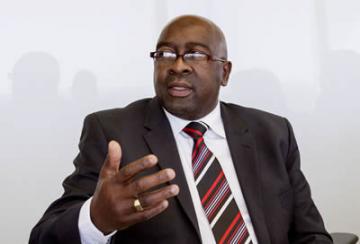Affordable housing comes to Sub-Sahara Africa
 SA Finance Minister, Nhlanhla Nene also addressed the conference saying that the government has a national affordable housing programme which helps fund projects in the country.
SA Finance Minister, Nhlanhla Nene also addressed the conference saying that the government has a national affordable housing programme which helps fund projects in the country.
Affordable housing is a burgeoning market across Africa. This is according to various experts who spoke at a summit about affordable housing which took place in Johannesburg last week.
The conference was hosted by private company, International Housing Solutions (IHS) in partnership with Property Finance at Nedbank Corporate and Investment Banking.
Institutional investors appreciate that there is staggering demand for housing with much of it needing to be affordable, CEO of Redefine Properties Andrew Konig told AfricaPropertyNews.com.
“There is a growing population and listed funds appreciate this. Many people are moving into SA and its major cities like Johannesburg to work. They need places to stay. We recognize that this is an opportunity for listed funds,” said Mr Konig.
For over a decade, SA listed property funds avoided residential property. It was seen as being not particularly profitable and also difficult to manage.
Other Real Estate Investment Trusts (Reits) that are buying into affordable housing in South Africa include Arrowhead Properties and Vukile Property Fund.
Indluplace Properties listed earlier this year becoming the JSE’s first residential-focused Reit. It is led by residential property expert, Marc Kaplan and in July acquired nine high-rise apartment buildings in Hillbrow and Joubert Park in a deal worth R420m. This increased the group’s portfolio to R2bn.
Financing affordable housing need not be particularly difficult according to Rob Wesselo, the MD of IHS.
“Demand is there and we are finding more and more ways to build cost effectively. The guys at Calgro M3 are doing a great job, for example,” he said.
Ben Pierre Malherbe, CEO of Calgro M3 said there various ways to finance affordable housing in SA and Africa.
"Sometimes people borrow at high ratios from banks, like 50 percent loan to book value but I have seen people pay less. The key is that the product needs to be a quality product, "he says.
Another listed group working with affordable housing is Octodec Investments which has a development property pipeline worth R1bn.
The JSE-listed real estate investment trust’s pipeline includes residential developments in Pretoria and Johannesburg’s inner cities.
Octodec CEO, Jeffrey Wapnick says people do not want to live in low quality houses. While, they could only afford affordable houses, there is no reason why these people cannot live in good quality affordable housing.
"Not everyone can stay in suburbs. People want to live near work but at affordable costs. This is why we are building more housing developments today than we have in more than ten years," Mr Wapnick says.
Fayaz Mottiar of Absa Asset Management says that investors will support listed property groups undertaking residential developments.
“They like the credibility that comes with listed property groups. Listed groups can call on funds if developments become expensive,” he says.
Even banks have recognized that residential property offers profit making potential of residential property projects.
“We are providing finance for projects and will look to fund housing developments in various African countries,” Robin Lockhart Ross, Managing Executive for Nedbank Corporate Property Finance says.
Affordable housing can be managed using green technologies too.
Grahame Cruickshanks, manager for climate change, sustainability services and green buildings at EY says new housing can be built using green materials.
The listed property market also realizes that currently there are not many shopping malls available for sale. There is some demand for new malls but it is not that significant in certain parts of Africa. It is however quite extensive in countries including Nigeria, Ghana and Kenya. But those countries require a large variation of developments.
Developers believe they can get 20% plus returns on housing projects in Africa.
Many banking heads such as Mr Lockhart Ross and Standard Bank's real estate finance head Gerhard Zeelie agree that there are strong returns to be made in African affordable housing.
Zeelie says the growing middle class and population growth are both attractive.
Des de Beer who heads up Resilient Africa a developer in Nigeria, says there needs to be more capital flows into Africa. Sales of large lot size property across Africa were worth R28bn last year, and South Africa accounted for R26bn, a lion's share, he says.
De Beer says a major obstacle has been how difficult it is to raise debt finance. "There is a heavy reliance on debt rather than own equity," he says.
Most Popular
Watch: A Credible Market, the need for Standards in Property Industry
Valuation standards have a significant role to play in helping to regulate professional practice at national, regional and global levels, promoting professional ethics, integrity, impartiality and trust in valuer activities in the property industry. ... Full story











